The Biden State Department made the astounding claim Friday that the Taliban and its brother organization, the Haqqani Network, are “separate entities.”
In truth, the two are tightly linked, and many of the top Haqqani leaders – including self-described “Kabul chief of security” Khalil Ur-Rahman Haqqani – are also high-ranking Taliban officials.
Terrorism experts were thunderstruck by the State Department’s blatantly false assertion, which it appears to have made to deflect public outrage over the Biden administration entrusting the safety of Americans still trapped in Afghanistan to a U.S.- and U.N.-designated terrorist organization.
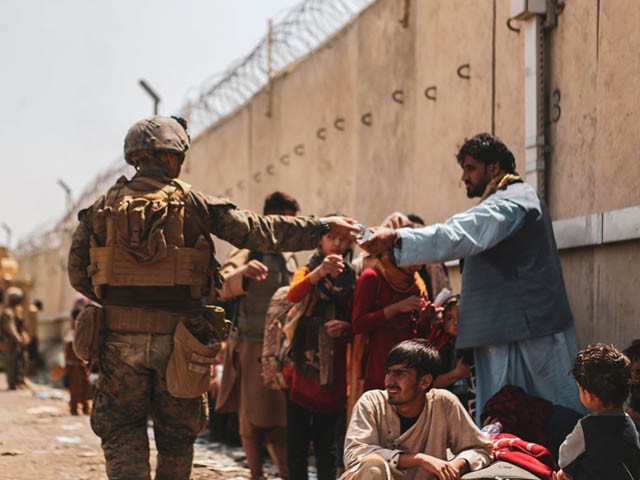
This handout image shows A Marine with the 24th Marine Expeditionary unit (MEU) passes out water to evacuees during an evacuation at Hamid Karzai International Airport, Kabul, Afghanistan, Aug. 22. U.S. service members are assisting the Department of State with a Non-combatant Evacuation Operation (NEO) in Afghanistan. (Photo by Sgt. Isaiah Campbell / U.S. Marine Corps via Getty Images)
The Taliban’s Kabul security chief Khalil Ur-Rahman Haqqani – his last name should have been a clue for the Biden State Department – was designated a terrorist in 2008 by the U.S. government, which offered a $5 million reward for information leading to his arrest. The widely acknowledged deputy leader of the Taliban also happens to be named Haqqani: Sirajuddin Haqqani, who is also the number one leader of the Haqqani Network.
The Biden administration has entrusted airport security in Kabul to Haqqani and his operatives and has reportedly provided them with information about Americans trapped in Afghanistan, ostensibly so the Taliban will allow them to access the airport.
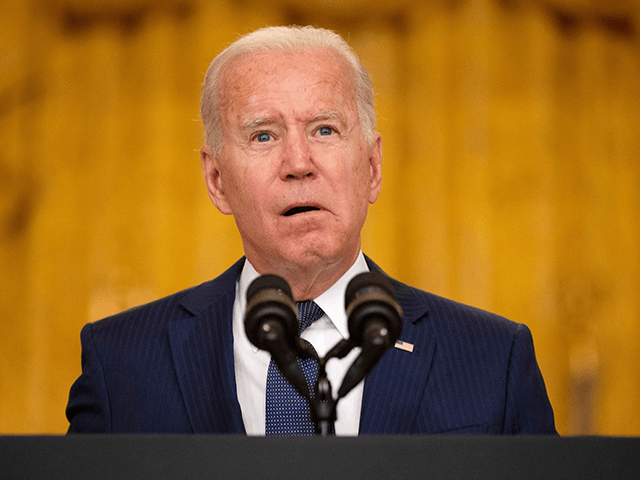
US President Joe Biden delivers remarks on the terror attack at Hamid Karzai International Airport, and the US service members and Afghan victims killed and wounded, in the East Room of the White House, Washington, DC on August 26, 2021. (JIM WATSON/AFP via Getty Images)
NBC News noted on Thursday, with considerable understatement, that Haqqani’s promises to “provide safety” at the airport were “called into question by what a Pentagon spokesman called a ‘complex’ bombing attack outside Kabul airport Thursday that killed 13 U.S. service members and caused an undetermined number of Afghan casualties.”
The total death toll from the ISIS-claimed suicide bombing at the airport reached 200 as of Friday afternoon.
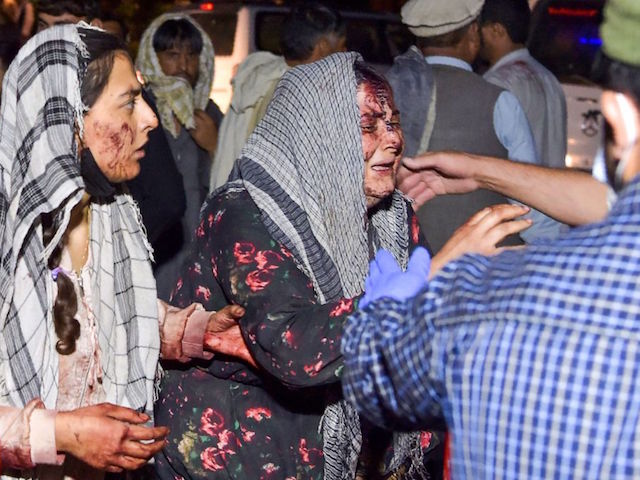
EDITORS NOTE: Graphic content / TOPSHOT – Wounded women arrive at a hospital for treatment after two blasts, which killed at least five and wounded a dozen, outside the airport in Kabul on August 26, 2021. (WAKIL KOHSAR/AFP via Getty Images)
The Haqqani Network is a hybrid terrorist organization and organized crime gang that President Joe Biden should have remembered since they were instrumental in the kidnapping of U.S. deserter Bowe Bergdahl. Biden was vice president when President Barack Obama traded five high-ranking Taliban officers for Bergdahl in May 2014. The “Taliban Five” soon returned to the battlefield despite Obama’s assurances to the contrary. Some of them were involved in the Taliban conquest of Afghanistan this month.
Khalil is the stepbrother of Haqqani Network founder Jalaluddin Haqqani, who died in September 2018 from Parkinson’s disease, and uncle to the current leader of the organization, Sirajuddin Haqqani.
Jalaluddin formed the Haqqani Network during the Soviet invasion of Afghanistan in the 1980s. He began merging it with the Taliban in the late 1990s, and eventually accepted a post as minister for border affairs in the first Taliban regime.
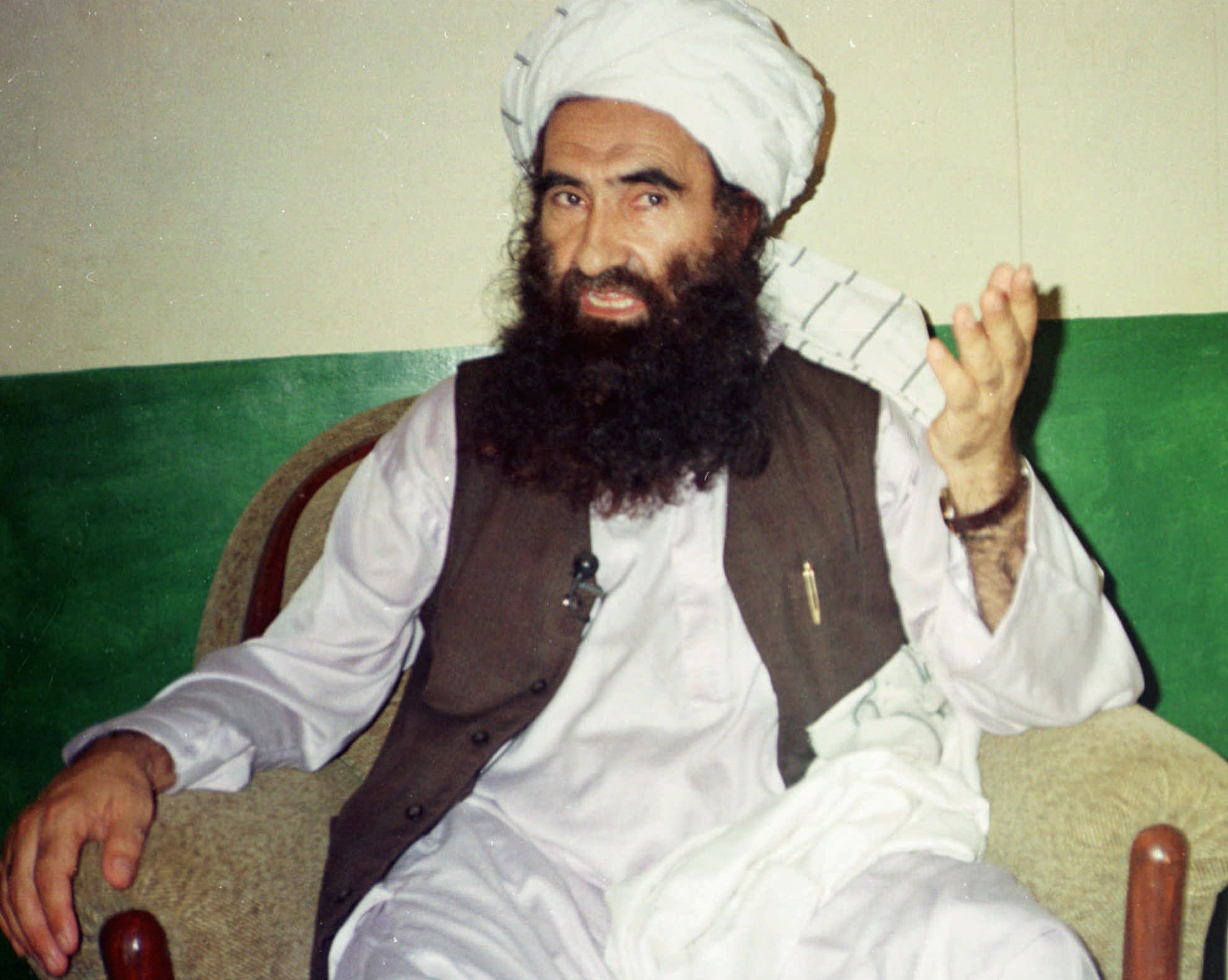
In this Saturday Aug. 22, 1998 file photo, Jalaluddin Haqqani, then Taliban Army Supreme Commander, speaks during an interview in Miram Shah, Pakistan. Al-Qaida has maintained longtime ties with a number of key figures within the broad coalition that is fighting U.S. and NATO forces in Afghanistan. Chief among them are Haqqani and his son Sirajuddin, whose Pakistan-based forces are battling the Americans and their allies across eastern Afghanistan. (AP Photo/Mohammed Riaz, file)
The Haqqanis became more aggressively terrorist under the leadership of Jalaluddin’s son Sirajuddin, a wanted criminal under U.S. law like Khalil who has a $5 million reward for information leading to his arrest.
The FBI charges Sirajuddin with masterminding attacks across the Pakistani border against American forces in Afghanistan and also links him to the savage 2008 Taliban attack on a hotel in Kabul that killed an American citizen plus six others.
Despite these allegations, the New York Times (NYT) controversially allowed Sirajuddin Haqqani to write an op-ed in February entitled “What We, the Taliban, Want.” The NYT identified him only as “deputy leader of the Taliban,” not as leader of the Haqqani terrorist organization.
In his NYT article, Sirajuddin claimed the Taliban desired only peace, wished to negotiate a reasonable settlement with the government in Kabul, and wanted Afghanistan to be governed according to a “consensus among Afghans.” The op-ed did not hold up well over time.
The Haqqani Network is the glue that binds the Taliban to al-Qaeda. Jalaluddin Haqqani was a friend and mentor to Osama bin Laden, who was very nearly killed in a U.S. missile strike on a Haqqani base in 1998.
The U.S. Director of National Intelligence (DNI) described the Haqqanis as “the most lethal and sophisticated insurgent group targeting U.S., Coalition, and Afghan forces in Afghanistan,” with a penchant for “small-arms assaults coupled with rocket attacks, IEDs, suicide attacks, and attacks using bomb-laden vehicles.”
“I do not believe that anyone in the West fully understands the reach of the Haqqani network. It is the single most impressive non-state militant group I have ever seen, with the exception of ISIS in the first two years of the caliphate,” retired Lt. Gen. Michael K. Nagata told the Wall Street Journal on Thursday.
The Haqqani Network was designated a foreign terrorist organization by the U.S. government in 2012. The Taliban has not been so designated.
In addition to being wanted by the FBI, Khalil Haqqani was designated a terrorist by the United Nations in 2011. The U.N. cited his work as a fundraiser for the Taliban and said he has “acted on behalf of al-Qaeda and has been linked to its military operations.”
Aside from his questionable work as a security director, Khalil Haqqani has been doing some public relations work for the Taliban regime. He gave a speech outside Kabul’s largest mosque to a cheering throng of supporters on Friday, after attending prayer services while surrounded by a commando squad and carrying one of the new American assault rifles provided to the Taliban – and by extension the Haqqanis and their al-Qaeda friends – by President Joe Biden.
“If we can defeat superpowers, surely we can provide safety to the Afghan people,” Khalil told Al Jazeera News in an interview published on Sunday.
“Our hostility was with the occupation. There was a superpower that came from the outside to divide us. They forced a war unto us. We have no hostility with anyone, we are all Afghans,” he said.
In another Sunday interview, Khalil offered amnesty to former Afghan President Ashraf Ghani, who fled the country with an allegedly huge amount of cash before the Taliban captured Kabul, and former Vice President Amrullah Saleh, who joined a resistance movement against the Taliban.
“The fact we have Khalil al-Rahman Haqqani in charge of Kabul security is dismaying,” a British intelligence official told Voice of America News (VOA) last week. “The Haqqani and al-Qaeda have a long history together, you could argue they are intertwined, and it is highly unlikely they will cut ties.”
Another British source, retired diplomat Ivor Roberts, told VOA that putting Khalil Haqqani and his network in charge of airport security was like “the fox being put in charge of a chicken coop.”
Roberts thought the Taliban, which has been attempting to present itself as more moderate and responsible than the regime overthrown by the U.S. after 9/11, made a surprising blunder by putting the vicious Haqqanis front and center. Another explanation would be that the Taliban enjoys taunting and humiliating the Biden administration.
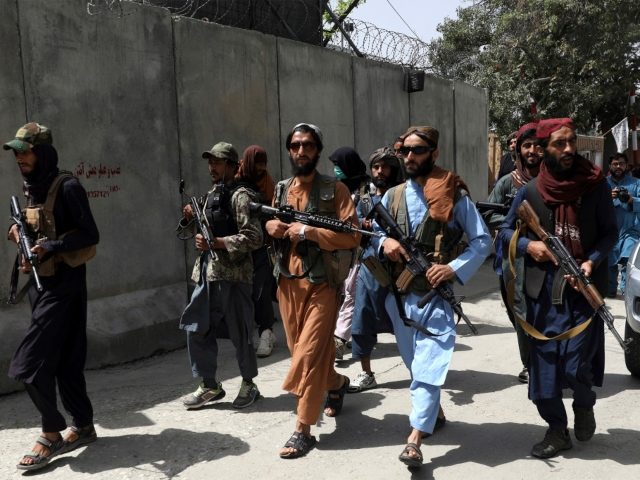
COMMENTS
Please let us know if you're having issues with commenting.